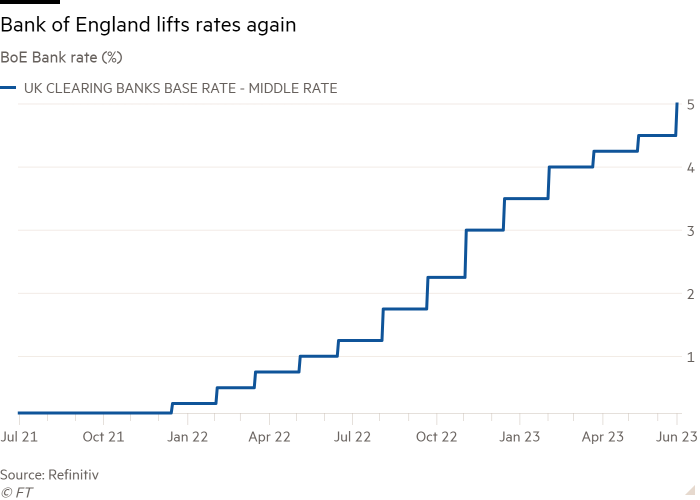Receive free UK interest rates updates
We’ll send you a myFT Daily Digest email rounding up the latest UK interest rates news every morning.
The Bank of England has raised interest rates to 5 per cent, a surprise half-point rise that shows the central bank stepping up its fight against persistent inflation.
Voting seven to two in favour of the larger-than-expected increase, the BoE’s Monetary Policy Committee said on Thursday it was responding to “material news” in recent data that showed stronger inflationary pressures in the UK economy.
The BoE hopes its decisive move — taking rates to their highest level since 2008 — will demonstrate its determination to get a grip on inflation, which was stuck at 8.7 per cent in May.
“We know this is hard — many people with mortgages or loans will be understandably worried about what this means for them,” said governor Andrew Bailey.
“But if we don’t raise rates now, it could be worse later. We are committed to returning inflation to the 2 per cent target and will make the decisions necessary to achieve that.”
Chancellor Jeremy Hunt said the BoE “has my full support”. The government’s commitment to the 2 per cent inflation target was “iron clad”, he said, and “tackling inflation relentlessly must be the immediate priority”.

With its 13th consecutive rate rise, the MPC defied market and most economists’ expectations of a quarter-point increase.
It will reinforce market movements over the past month that have prompted lenders to reprice fixed-rate mortgage deals in what has become known as a mortgage “time bomb”.
Borrowers on variable or tracker deals are likely to see their monthly bills rise rapidly. For a borrower with a £200,000 mortgage over 25 years on a standard variable rate of 7.99 per cent, their payments will rise by £67 a month — or £800 a year — according to broker L&C Mortgages.
Justifying the move, the MPC said: “There has been significant upside news in recent data that indicates more persistence in the inflation process.”
Bailey added that the decision had been taken “in light of stronger resilience in the UK economy and further evidence of persistence in inflation”.
Implementing such a large rate rise makes the BoE an outlier among other major central banks. Last week, the US Federal Reserve skipped a rate rise for the first time in more than a year, while the European Central Bank implemented a quarter-point rise.
A boost to sterling from the bigger-than-expected rate rise faded quickly. Having briefly risen to $1.2838, up 0.4 per cent against the dollar, the currency then traded flat at $1.277. UK government bond yields were little changed, with the two-year yield flat at 5.04 per cent.
Heading into the decision, swap markets had indicated that a slim majority of investors expected a quarter-point rate rise, although the likelihood of a half-point move had increased this week following the latest inflation data.
The MPC made little comment on market expectations that interest rates would climb to a peak of around 6 per cent by the end of the year. Instead, the committee reiterated its previous commitment to tighten monetary policy further “if there were to be evidence of more persistent pressures”.
The BoE’s move was met with dismay by business groups and unions.
“There should be absolutely no need to drive the economy into recession in a bid to deal with rising prices,” said Vicky Pryce, a member of the British Chambers of Commerce’s new economic advisory council.
Paul Nowak, general secretary of the Trades Union Congress, said the decision was the result of “dangerous group-think in the Bank of England and Downing Street” and would cost people their jobs and homes.
Several economists, however, said the BoE move was necessary. “With the labour market still very tight by past standards, we think the MPC will need to go further still in the coming months to tame inflation,” said Jessica Hinds at Fitch Ratings.
Melissa Davies, chief economist at the research group Redburn, said that “both monetary and fiscal policy largesse needs to be reined in”, leaving the BoE “little choice but to plough on . . . with its rapid tightening”.
In the minutes of the MPC meeting, the seven members who voted for the large increase pointed in particular to inflation data and labour market figures over the past six weeks that had been significantly worse than they had forecast in early May.
Without updating those forecasts, the MPC minutes said annual private sector regular pay growth of 7.6 per cent in the three months to April was 0.5 percentage points higher than they had expected. Services inflation of 7.4 per cent in May was also half a percentage point higher than the bank’s models had predicted.
These forecast errors have caused the BoE significant embarrassment in recent weeks, with Bailey accepting the central bank had “lessons to learn” before it rushed out a review of forecasting models and communication.
Raising the interest rate to 5 per cent has already increased borrowing costs to a higher level than the BoE suggested would be the peak rate in its May forecasts.
Although the BoE still expects inflation to fall “significantly” over the rest of this year, the committee noted that “second-round effects in domestic price and wage developments generated by external cost shocks are likely to take longer to unwind than they did to emerge”.
The two members who dissented from the majority vote — Swati Dhingra and Silvana Tenreyro — voted to hold interest rates at 4.5 per cent. They said the effects of the rate rises already implemented “were still to come through”.
Stay connected with us on social media platform for instant update click here to join our Twitter, & Facebook
We are now on Telegram. Click here to join our channel (@TechiUpdate) and stay updated with the latest Technology headlines.
For all the latest Business News Click Here
For the latest news and updates, follow us on Google News.
